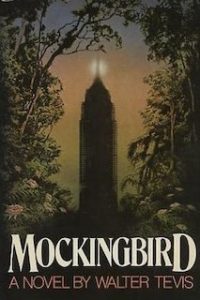 Published in 1980, four years before his death at age 56 of lung cancer, Walter Tevis’s novel Mockingbird is a powerful vision of future mankind on the decline. The novel does incorporate some major threads of previously-explored dystopian Sc-Fi thought, but Tevis still manages to make them his own. Mockingbird is an underrated book that should be considered a classic of Sci-Fi, alongside Brave New World, Do Androids Dream of Electric Sheep?, Fahrenheit 451, The Children of Men, I am Legend, etc.
Published in 1980, four years before his death at age 56 of lung cancer, Walter Tevis’s novel Mockingbird is a powerful vision of future mankind on the decline. The novel does incorporate some major threads of previously-explored dystopian Sc-Fi thought, but Tevis still manages to make them his own. Mockingbird is an underrated book that should be considered a classic of Sci-Fi, alongside Brave New World, Do Androids Dream of Electric Sheep?, Fahrenheit 451, The Children of Men, I am Legend, etc.
This past winter the success of the Netflix series The Queen’s Gambit, based on a Tevis novel, revived the author’s profile. During the course of his career, the talented Tevis had three of his books turned into feature films: The Hustler, The Man Who Fell to Earth and The Color of Money. Since I binge-watched Gambit and enjoyed it, I was intrigued by Tevis. I decided to dive into Mockingbird and was delighted by the plunge.
The novel has three main characters, one of whom is a world-weary robot. The story occurs in a world that’s running down, as humans are no longer reproducing and thus inexorably dying out. Almost as bad, however, they’ve already died intellectually. The majority of humans have forgotten how to read. Their lives are coddled by pills, cannabis and legions of robots. In constructing his future world, Tevis invents clever terminology that is similar to, though not as lush as, the verbal inventiveness of Anthony Burgess’s A Clockwork Orange.
It’s a elegiac story of human decline that is nearly perfectly balanced between the sadness of a vanished human past and its terminal future. While that sounds like an unpleasant journey, Tevis is a gifted writer who understands the power of simple truths, chiefly the beguiling pull of love. Mockingbird is sad, but it’s also beautiful, inventive, strangely heartfelt and emotionally true and carries a seed of hope to the end.
